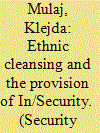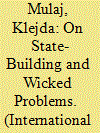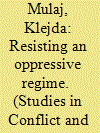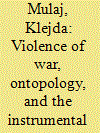|
|
|
Sort Order |
|
|
|
Items / Page
|
|
|
|
|
|
|
| Srl | Item |
| 1 |
ID:
099899


|
|
|
|
|
| Publication |
2010.
|
| Summary/Abstract |
America won an asymmetric war in Iraq and lost an asymmetric peace. Translating material power advantage into favourable political outcomes has been a challenge for great powers down the ages-what makes this bridge even more difficult to cross today is the raised expectations on the part of liberal publics about the moral purpose of US-led interventions. In this sense, Iraq is part of the explanation for why influential liberals believe there is a 'crisis' in America's world leadership. 'America after Iraq' subjects this claim to analytical scrutiny-in particular it addresses whether Iraq was simply a chapter in a longer book detailing American power and purpose in the post-9/11 world? In answering this question the article is drawn to consider conceptual debates about a shift in the international system from anarchy to hierarchy with the US as the hegemonic power. While it rejects strong versions of the hierarchy thesis that imply the Washington is the new Rome, it is nevertheless drawn to an understanding of a hierarchical form of ordering where the US oscillates between a hegemonic role and an imperial outlaw. Seen through this lens, the Iraq War was an intervention that happened because it could, and not because it was just or necessary. Public opinion and the weakness of domestic institutions are also critical factors in explaining how it was possible for a previously status-quo oriented hegemonic power to act recklessly and put the rules and institutions of international society under strain.
|
|
|
|
|
|
|
|
|
|
|
|
|
|
|
|
| 2 |
ID:
078776


|
|
|
|
|
| Publication |
2007.
|
| Summary/Abstract |
The phenomenon of ethnic cleansing has either been considered by analysts from the point of view of history, or (ethnic) nationalism, or interpreted as the dark side of democracy. Underemphasized in the literature has been the link between the expulsion of targeted communities and the policy and practice of security. Yet, at various times, ethnic cleansing has been used as a security-creation mechanism in the process of nation-state building. Prioritization of the state in security policy and practice has provided justification for drastic measures against targeted peoples. This article seeks to offer a critique of the official rationale for the expulsion of targeted communities in terms of security. It contends that ethnic cleansing is flawed as a means of securing national security. Indeed, not only has ethnic cleansing resulted in humanitarian catastrophe, but the attainment of its stated objective - namely, the provision of security - can be unfeasible. Although state security remains an important value, its acquisition may no longer be justified independently of the means employed in its pursuit.
|
|
|
|
|
|
|
|
|
|
|
|
|
|
|
|
| 3 |
ID:
061854


|
|
|
| 4 |
ID:
167049


|
|
|
|
|
| Summary/Abstract |
Responding to a set of wicked problems pertaining to weak or failed states, state-building remains circumscribed by many of the problems it strives to address. Despite the expansion of literature, the challenging task of (re)building states in a postconflict setting is characterized by inadequate intellectual and policy coherence. Engaging with the existing literature, this article seeks to add clarity in ways that relate directly to the agendas of academic research and policy making. Casting into sharper relief what is distinctive and/or familiar in state formation processes in the West and the rest of the world, the analysis highlights the differing impact of nationalism. In considering the critique that contemporary international-led state-building neglects nation-building, the article suggests that the stateness of polities undergoing state-building is intrinsically linked with nationhood. State-building resides in both international and national locations of politics which condition the constitution of national identity via multiple (unequal) exchanges between external and local actors that can be depicted in terms of mimicry. Multiple political locations of state-building notwithstanding, the task of bringing the imagined community into being is more suited to national actors. Ongoing challenges of nation- and state-building require more acknowledgement that the realization of the nation cannot be a primary domain of international actors.
|
|
|
|
|
|
|
|
|
|
|
|
|
|
|
|
| 5 |
ID:
084999


|
|
|
|
|
| Publication |
2008.
|
| Summary/Abstract |
Although no war faction escapes controversy, it is often said that the Kosovo Liberation Army (KLA) is one of the most successful guerrilla movements in recent history. This article suggests that KLA's success can be attributed to the symbiosis between national and international legitimacy. The guerrilla's mission should be understood in the context of persistent oppression of the Kosovo Albanians by Serbian governments. Whilst failure of peaceful resistance enabled KLA's national legitimation, its tactics and strategy acted as a force multiplier for its recognition and success. KLA's resilience in the face of vicious Serbian suppression of Kosovo Albanians raised international awareness and prompted NATO's support, an act that contributed to guerrillas' endorsement at the international level.
|
|
|
|
|
|
|
|
|
|
|
|
|
|
|
|
| 6 |
ID:
157726


|
|
|
|
|
| Summary/Abstract |
This article considers a neglected question in International Relations, namely how violence of war contributes to the constitution of the political community at the intersection between war and peace. It exposes limitations of means-ends, instrumental understanding of war violence due to the overlooking of violence’s performative attributes stemming from the centrality of bodily injuries in war. The instrumental violence on which the constitution of the political community is grounded finds expression in an order of representation that can be termed ontopology, and a pervasive – circular – relationship between ontopology and violence insofar as ontopology has inspired extreme forms of human behaviour and also been used to justify violence as a means to enact an ontopological goal. Yet, recognising the role of bodily injuries in the course of fighting allows for a more complete understanding of war. Crucially it enables an interpretation of the structure of war as a relation between war’s interior content – casualties in war – and the exterior, verbal issues standing outside it (pertaining to security, identity, sovereignty, authority, ideology), that lead to a surrogate contest of reimagining political community in the process of which performative power of violence contributes directly to the emerging post-war peace and laws that justify it.
|
|
|
|
|
|
|
|
|
|
|
|
|
|
|
|
|
|
|
|
|